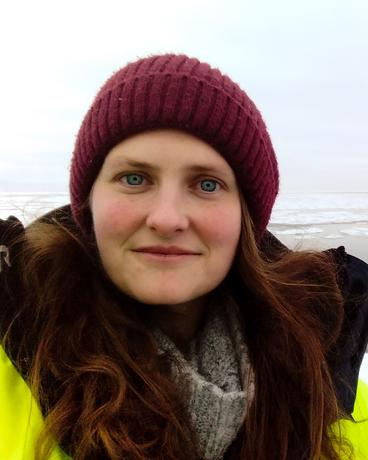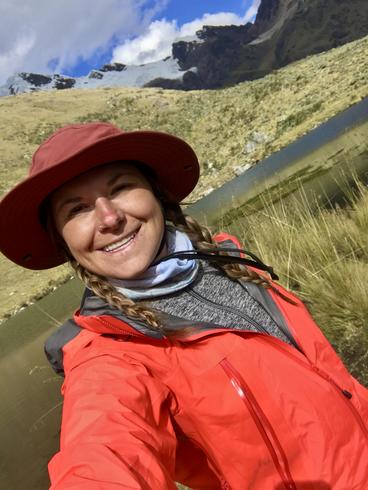Logo for the Knauss Fellowship, with pictures of finalists Tamera Breidenbach (left) and Evelyn Strombom (right). Image credit: Cait Dettmann.
ST. PAUL and DULUTH, Minn. — The Knauss Fellowship, established in 1979 by the National Sea Grant College Program, has supported more than 1,600 exceptional graduate students passionate about Great Lakes and marine policy, offering them an immersive opportunity to work alongside top federal policymakers in Washington, D.C. Minnesota Sea Grant’s 2025 finalists will join a cohort of 88 talented individuals from across the nation, representing 70 universities, in this highly competitive, one-year fellowship.
“Fellows bring a wealth of experience from many disciplines and, importantly to their host offices, fresh perspectives with which they can address contemporary and complex challenges,” said Minnesota Sea Grant Director John A. Downing. “Many of our past fellows have gone on to become leaders in science, policy and public administration.”
The Sea Grant Knauss Fellowship offers graduate students a pathway into national policymaking, with a focus on Great Lakes, coastal, and marine issues. This year’s cohort includes 44 master’s, 41 Ph.D., and 3 J.D. candidates from diverse fields like geography, ichthyology, ecology, law, and environmental management.
Meet Minnesota’s 2025 Knauss Finalists:

Evelyn Strombom, a Ph.D. candidate in ecology, evolution, and behavior at the University of Minnesota, focuses her research on Arctic fisheries and the impact of climate change on the Barents Sea. Her work addresses the vulnerabilities of both marine ecosystems and local fishing communities, particularly in Norway and Russia. Strombom wrote that as someone with Scandinavian heritage, building a connection to Norway and Sweden through her work has been personally very meaningful.
“I feel extremely fortunate to have had the opportunity to go to northern Norway and contribute research to one of the best-managed fisheries in the world,” Strombom wrote. “I'm even more excited to bring that insight home and start finding ways to help leverage international scientific cooperation for the long-term security of our national marine resources.”

Tamera Breidenbach, a Master of Science graduate in forest sciences from Colorado State University, has conducted extensive research on state-level climate adaptation policies for forested landscapes. Her background includes work in ecological management and public service roles at various levels of government. Breidenbach wrote that her Appalachian roots in western North Carolina fostered her deep appreciation and connection to diverse ecosystems and the vital services they provide, which enhanced her understanding of the intricate connections between people and the environment.
“Witnessing the destruction and devastation caused by Hurricane Helene on the communities I call home across Western North Carolina, and its impact on those close to me as well as others in the community, has deepened my commitment to this career path,” she said.
“I am honored to represent Minnesota Sea Grant as a Knauss Fellow finalist,” said Breidenbach. “My aim is to utilize my understanding of social and ecological systems, combined with my technical expertise, to assist in efforts that protect communities and ecosystems from natural disasters and hazards.”
Looking Ahead: Knauss Fellowship Class of 2025
The 46th class of Sea Grant Knauss Fellows will begin their assignments in February 2025, continuing the legacy of over 1,680 professionals who have gone through the program. Placement of the 2025 finalists is contingent upon fiscal year 2025 funding.
“The Knauss Fellowship is one of several outstanding Sea Grant-supported fellowship programs,” said Minnesota Sea Grant Research and Fellowship Coordinator Alex Frie. “I encourage interested students/students interested in water-science opportunities to submit our fellowship interest form."
ADDITIONAL INFORMATION
Minnesota Sea Grant is a systemwide program of the University of Minnesota and one of 34 Sea Grant federal-university partnerships across the country that bring applied water science to communities. MNSG has staff and offices on the Duluth and St. Paul campuses. Our extension educators, researchers, and communicators work with community members, local decision-makers, policy leaders, and personnel from resource agencies, business, and industry to enhance the use and conservation of Great Lakes and Minnesota’s inland water resources to create strong and sustainable economies, healthy environments, and resilient and inclusive communities.
Recruitment for the 2026 Knauss Fellowship Program begins in the fall of 2024. Applicants must apply through their state Sea Grant program. Contact Minnesota Sea Grant Research and Fellowship Coordinator Alex Frie for Knauss Fellowship information.
CONTACTS:
Alex Frie, research and fellowship coordinator, Minnesota Sea Grant, University of Minnesota, and University of Minnesota Duluth, afrie@umn.edu
John A. Downing, director, Minnesota Sea Grant, University of Minnesota and University of Minnesota Duluth, downing@d.umn.edu
Amanda Shie, communications associate, Minnesota Sea Grant, University of Minnesota and University of Minnesota Duluth, shie0093@umn.edu
Marie Thoms, communications manager, Minnesota Sea Grant, University of Minnesota and University of Minnesota Duluth, methoms@d.umn.edu
